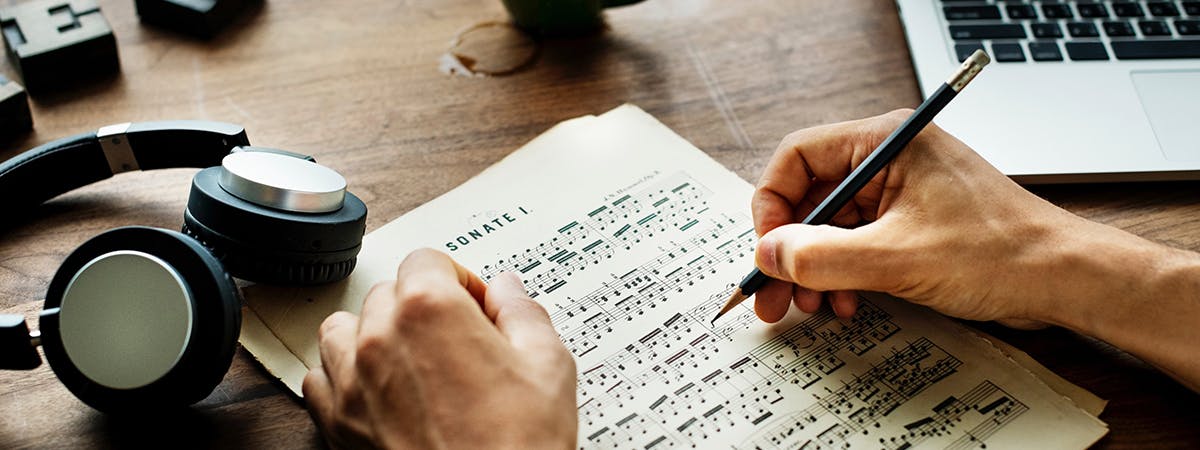Listen, Imagine, Compose (LIC) is a project designed to investigate pedagogies of composing in secondary schools.

Researchers
- Martin Fautley (Birmingham City University)
- Pam Burnard and John Finney (Cambridge University)
- Pauline Adams (Institute of Education)
- Jonathan Savage (Manchester Metropolitan University).
Birmingham City University was the lead academic partner in this project.
Background
Listen Imagine Compose (LIC) investigates how composing is taught and learned in secondary schools and draws on the expertise of teachers and their pupils, composers, music education academics and arts organisations. It is organised by Sound and Music (SAM), Birmingham Contemporary Music Group (BCMG), with Birmingham City University as the lead academic partner.
The 2009 Ofsted report Making More of Music (Ofsted, 2009) highlighted weaknesses in current secondary school music provision, including:
- Lack of attention to internalising sound as a basis for creative thinking;
- Lack of quality and depth in pupil responses;
- Insufficient understanding of what musical progress involves;
- Composing activities are rarely related to the work of established composers.
Since 2010, LIC addressed these issues through interaction between pupils and their teachers with professional composers and performers through 3 phases:
- Phase One: (2011-2013): An action research project funded by the Esmée Fairbairn foundation involving contemporary composers, musicians, schoolteachers, researchers, music education partners, and critical friends.
- Phase Two: (2014-2015): Drawing on the recommendations of the Phase 1 report, a Continuing Professional Development course for secondary teachers which was piloted during the 2014/15 academic year.A Continuing Professional Development course for secondary music teachers was piloted in Birmingham and London.
- Phase Three: The CPD is now available through free Listen Imagine Compose Teacher Network Events and as an accredited course at Masters Level (Level 7).
Research aims
The main research questions from Phase 1 were:
- How can composers and teachers be supported to work most effectively together?
- How do professional composers make judgements about the quality of compositions and what are the indicators of progression? What correlation is there between these criteria and those of exam boards?
- What does creative progression look like – for example the difference between a Year 7 and a Year 9 composition – and how can we ensure progression within the secondary curriculum, particularly given the genre-based approach?
- What are the challenges around assessing creativity and how can students be supported to take risks, fail and experiment in a system where assessment is central?
- What can we learn from the processes of professional composers and how does that relate to how composition is taught in schools?
- How can we engage young people with contemporary experimental music beyond a one-off project, and how can that learning be applied to composing within other styles and genres – in particular the types of music that young people are listening to?
- How can effective feedback develop young people’s listening and composition skills?
- How can we increase awareness of the music of living composers within the secondary curriculum?
- What are the strategies of educators around creativity and how could they benefit composers working in learning contexts?
Method of research
The above research questions were separated into six research strands, addressed by a different composer/researcher team. A mixed methodology was involved which included case study approaches and an evaluative framework. Qualitative data was collected accordingly, which included video, audio, field-notes, questionnaires, reflective diaries, lesson observations, pupil work trails, and interviews.
Martin Fautley, in collaboration with teaching and composing partners, worked on two of the strands:
- What processes for evaluating pupil work can be adopted to give constructive feedback and encourage peer review?
- How can performers and composers best be used as a resource in the classroom?
Findings
Drawing on the recommendations of the Phase 1 report Continuing Professional Development courses have been produced including as an accredited course at Master's level (Level 7).
Martin Fautley produced a final project report, which can be downloaded. It includes recommendations and areas for further research. The findings from Birmingham City University’s two strands were:
What helps students to learn to evaluate?
- Questioning by the teacher
- Asking themselves the same questions (developing a habit of evaluating)
- Creating their own criteria and concepts for evaluation. By doing this they would begin to carve out an artistic intent, and clarity of style
What processes for evaluating pupil work can be adopted to give constructive feedback and encourage peer review?
- Questioning is a key pedagogic skill for all - composer, performer, as well as teacher
- Intentionality is significant - what do pupils what to compose?
- True Assessment for learning (AfL) can make a real difference (Fautley, 2010)
The other research strands and findings, can be viewed in the project Executive Summary.
Research Linked to Listen Imagine Compose Project
Kinsella, V., and Fautley, M. (2016). The use of Activity Theory as an analytical tool for the music learning processes. In Bugos, J (Ed) Contemporary Research in Music Learning Across the Lifespan. New York: Routledge
The use of Activity Theory as an analytical tool for the music learning processes.
Fautley, M. & Kinsella, V. (2015). Bloom’s Taxonomy and higher order thinking. In Natassa Economidou Stavrou & Mary Stakelum (Eds) Every Learner Counts: Democracy and Inclusion in Music Education. Volume 4 of European Perspectives on Music Education. EAS publications, Heilbling, Innsbruck, Austria
